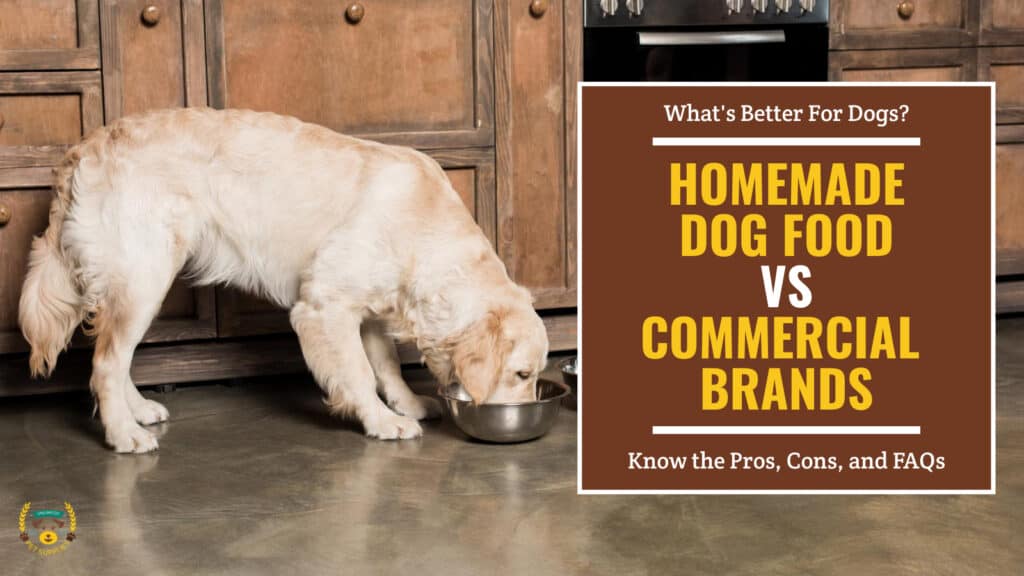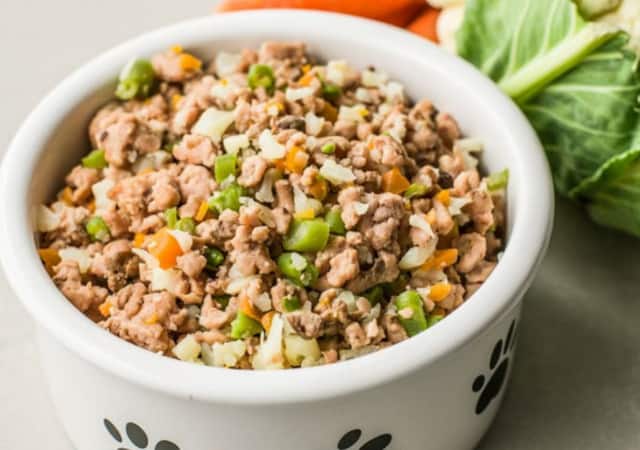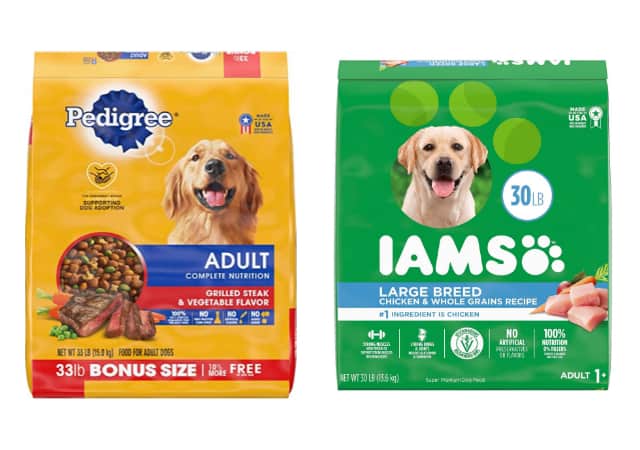Homemade Dog Food vs Commercial Brands: Which is Better?
Last updated: March 30, 2024

Summary
- Homemade dog food can be a healthier option for dogs, as it is free of preservatives and other additives.
- Commercial dog food is convenient and typically formulated to meet all of a dog's nutritional needs.
- It is important to make sure your dog's diet is nutritionally balanced, regardless of whether you choose to feed them homemade or commercial food.
- There are a number of factors to consider when choosing between homemade and commercial food, such as your dog's individual needs, your budget, and your lifestyle.
- If you do choose to feed your dog homemade food, it is important to consult with a veterinarian or canine nutritionist to ensure that their diet is meeting all of their nutritional needs.
Homemade cooked diets and raw diets are becoming more popular among pet owners as a result of Internet searches, commercial brand food recalls, and their desire to treat their pets like family members. There are some dog pet parents who are questioning whether commercial dog food is the best option for their pets as we move toward a more health-conscious world.
Homemade Dog Food
It is dubbed "homemade dog food" when pet owners prepare and cook their dogs' meals at home using the same "human food" components that we use in our own diets. It is feasible for dogs to be fed homemade dog food to avoid eating processed commercial brands, such as dry kibble and dried food.

Pros
The homemade dog food diet entails the following advantages:
Peace of Mind
Between 2007 and 2015, the Food and Drug Administration received more than 5,200 reports of diseases linked to pet treats. Even though the particular components causing the illnesses have yet to be identified in hundreds of canine deaths, certain marketed treats have been connected to their use [1].
There are several benefits to making dog treats at home, including knowing exactly what you are feeding your pet. There are no hidden chemicals, no suspiciously-sourced components, and you have complete control over what enters your dog's body with this supplement.
However, not everyone enjoys cooking at home, and it doesn't have to be that way. Pre-made meals are another alternative for providing your dog with whole foods.
Fresh and Not Preserved
Dogs benefit from a diet low in preservatives and high in fresh food, just as humans do. There are no chemical preservatives or extra salt in homemade dog food, unlike some top-grade dog foods.
These preservatives can exacerbate pre-existing health issues, such as cardiovascular disease, and contribute to general poor health.
Cons
The homemade dog food diets also have the following disadvantages:
Time-Consuming
It takes just as much time and effort to cook and prepare dog food as it does to cook and prepare human meals. It also necessitates a greater amount of time and effort than purchasing a pre-made meal.
No Quality Control Standards
Cat food, dog food, and the dog snacks you keep in your cupboard are all subject to FDA regulation. Similar to other animal foods, pet food is regulated by the FDA. All animal foods must meet similar standards as human foods under the Federal Food, Drug, and Cosmetic Act (FD&C Act), including being safe to consume, being manufactured under hygienic conditions, being free of hazardous ingredients, and be truthfully labeled [2].
Quality control is crucial to providing well-balanced food, and its lack is often apparent when producing your own homemade dog food.
What Nutrients Do Dogs Need In Homemade Dog Food
Carbohydrates, lipids, and protein are all essential for your pet's well-being (grains or vegetables). They also require calcium and vital fatty acids which can be obtained from dairy products or other ingredients, such as eggshells, certain plant oils, egg yolks, oatmeal, and other foods.
In addition to a balanced daily diet, it is important to consider the nutritional quality of the treats you offer your pet. Opting for jerky treats can provide your furry friend with healthy snacks that are not only delicious but also beneficial for their overall well-being.
How to Calculate Homemade Dog Food
One of the best things you can do for your dog's health and well-being is to provide them with fresh, homemade food, which you can do with the help of a homemade dog food calculator.
You may be inclined to cook your dog's meals at home. If so, you must know what to include in the cuisine to ensure a comprehensive and balanced diet. When it comes to digestion, dogs and humans don't work in the same way.
To put it another way, dog muscle is predominantly composed of oxidative fibers, which store and distribute oxygen to muscle cells fast. Their muscle is also better adapted than human muscle to utilize fat. In addition, your dog's nutritional requirements will vary depending on their daily routine (e.g., athletic dogs need a different diet).
Step 1. Find Resting Energy Requirement (RER)
Resting Energy Requirement is the energy requirement of a normal mammal at rest in a thermoneutral environment, depending on body weight. Furthermore, RER is the energy your dog requires to accomplish vital biological activities such as heart and brain function, digestion, and respiration.
Step 2. Figure Out Your Dog’s Daily Energy Requirements (DER)
Daily Energy Requirement is the typical daily energy consumption of an animal based on life stage and activity (work, gestation, lactation, and growth).
Step 3. Calculate
To calculate RER, multiply the animal's body weight in kilograms raised to the 3/4 power by 70, for example, a 10 kg (22 lb) adult neutered dog needs RER = 70 (10 kg) 3/4 which then results in 400 Calories/day for a healthy dog of that weight.
For a more comprehensive breakdown of determining RER, you may visit an article [3] published by The Ohio State University Veterinary Medical Center. In addition, this video (specifically from 12:27 to 24:56) from Everyday Vet may help you out.
Do not take these numbers as gospel. You need to recognize that these values are simply a broad starting point. They can vary by as much as 50%. Your veterinarian or a canine nutritionist can help you better understand your dog's caloric requirements when it comes to a homemade dog food diet.
Commercial Brands or Store-Bought Dog Food
Since the 1940s, pet meals have been manufactured in the United States and Europe, and today there are manufacturing facilities in the majority of developed nations. They originated from nutritionally-based animal feeds prepared for livestock [4].
As processed, mass-produced dog food became more popular in the 1950s, commercial pet food firms began to argue that it is a far more cost-effective way to keep pets healthy while feeding them processed food.
Complete and balanced pet food items are designed to be a pet's sole source of nutrition. The majority of pets are fed a restricted variety of commercial items and a small number of production batches over an extended period of time.
Apart from that, there are a number of commercial dog food brands that work well for pets with sensitive stomachs. Your dog may have food allergies. If so, here are the top dog food brands for dogs with allergies.

Pros
The commercial dog food diet entails the following advantages:
Convenience
Most pet parents cite this as a primary motivation for their choice. Most of them are working adults, therefore, they don't have the time to cook for their pets. As a result, the majority of pet owners feed their dogs dried food or commercial dog food.
Complete Nutrition
All of your dog's daily vitamin requirements are met in a properly balanced and prepared meal. Numerous commercial pet foods are supplemented with vitamins to satisfy your dog's nutritional needs. The Association of American Feed Control Officials (AAFCO) recognized diets should contain all of the necessary vitamins and minerals.
Cons
The commercial dog food diet may also have the following disadvantage:
It may have unnecessary additives and preservatives.
All pet food ingredients must be approved by the FDA. Foods people eat include the same antioxidants used to keep pet food from going rancid. Although they don't provide any nutritional benefit, some additives enhance the product's aesthetic appeal.
Whether you choose to go for homemade or commercial dog food, also keep in mind the water your dogs drink. It's important for your pets to be fed a balanced diet and given potable water.
Creating a Balanced Dog Diet
A diet that is comprehensive and well-balanced contains proteins, lipids, carbs, vitamins, and minerals. Water is also a life-sustaining necessity that must be obtained on a daily basis. Understanding how each nutrient is used in a dog's body as well as the processes and how much of each nutrient is needed to keep a dog healthy at every stage of its life may appear to be straightforward on the surface [5].

Nutritional Value and Dietary Information
Check with a reliable source of nutritional information before making your dog's home-cooked diet. To begin, talk to your dog's vet about moving to a home-cooked diet and which cookbooks or internet resources you can put your faith in.
Many online dog recipes do not provide complete nourishment, so beware of the DIYer. Consult board-certified online pet nutritionists for advice, recipes, and other ideas. A specific food plan for your best friend may be possible with the help of an expert nutritionist.
Variety is Essential
Despite the fact that not every meal has to be perfectly balanced, it is necessary to maintain a healthy diet over time. Because muscle meat is low in calcium and rich in phosphorus, calcium intake will never be adequate. Osteoporosis can occur in pets on diets lacking in calcium. Use calcium-rich foods like eggshell powder or mineral mixes meant for home cooking instead to avoid this.
Remember, it is always recommended to consult with a veterinarian in every decision you make to ensure that you are on the right path!
Cooking at home for your dog provides a variety of flavors and textures that commercially purchased food does not. The most essential benefit is that it contains a wide range of vitamins and nutrients that are not often found in dog food. While providing your dog with the nutrition they need, you can mix and match various items to create a range of flavors. Not to mention how content they will be!
Creating a balanced diet for your fur babies can help reduce the risks of common health problems that occur when your dogs age. Learn more about the usual health problems of dogs here.
Frequently Asked Questions
The following are the frequently asked questions regarding homemade dog food and commercial brands.
Is Homemade Dog Food Healthier Than Store-bought?
It doesn't matter if your pet eats store-bought or homemade food as long as its nutritional requirements are met. Unfortunately, home-cooked meals are frequently deficient in essential nutrients.
The long-term health benefits of whole-ingredient meals outweigh the short-term benefits of homemade diets, for which there is no scientific evidence. Commercially produced foods are designed to be balanced and complete.
Do Dogs Live Longer on Homemade Food?
Belgian scientists Bruno Sapy and Dr. Gerard Lippert researched more than 500 dogs over a five-year period and discovered that nutrition is a crucial factor in canine longevity. Despite the fact that a dog's size and breed have a significant impact on its lifetime, the owner has little influence over these factors [6].
In fact, the statistical analysis revealed that dogs fed industrially processed food live an average of 10.4 years, whereas dogs fed homemade food might live an average of 13.1 years.
Can I Mix Homemade Dog Food With Kibble?
If you mix homemade food with dog food, the homemade food will be slowed down by the balanced feed's sluggish digestion, resulting in inappropriate fermentation in the stomach, which can produce gas and raise the risk of stomach torsion.
In order to make this combo work, you must have only 5% of the dog food from the store. Nonetheless, we must emphasize that creating this combo is not advisable.
Is It Worth It To Make Your Own Dog Food?
There are several advantages to cooking your dog's food, such as a more diverse and possibly higher-quality diet, fewer preservatives and additives, and, of course, the chance to tailor the recipe to your dog's specific preferences. You may even be able to feed your dog well for less money if you prepare your own dog food at home. However, take into consideration some aforementioned factors such as nutritional value and dietary information.
Final Verdict
It is our duty to make sure our dogs receive the proper nourishment and dietary supplements to have them lead a long and healthy life. Their coats get better, they get more energy, and their immune systems are stronger, all of which help them battle disease. Just as it does for humans when we are more deliberate with our own diets, being more intentional with your dog's diet can contribute to a healthier lifestyle in general.
References:
- FDA Investigates Animal Illnesses Linked to Jerky Pet Treats. Food and Drug Administration. Retrieved from https://www.fda.gov/animal-veterinary/outbreaks-and-advisories/fda-investigates-animal-illnesses-linked-jerky-pet-treats
- Pet Food. Food and Drug Administration. Retrieved from https://www.fda.gov/animal-veterinary/animal-food-feeds/pet-food
- Basic Calorie Calculator for Dogs and Cats. The Ohio State University Medical Center. Retrieved from https://vet.osu.edu/vmc/companion/our-services/nutrition-support-service/basic-calorie-calculator
- Pet Foods, Encyclopedia of Grain Science. R.C.E. Guy. Retrieved from https://www.sciencedirect.com/science/article/pii/B0127654909001270
- Dog Nutrition: Guide to Dog Food Nutrients. Pet MD. Retrieved from: https://www.petmd.com/dog/nutrition/evr_dg_whats_in_a_balanced_dog_food
- Relation between the domestic dogs’ well-being and life expectancy statistical essay. Lipert, G. & Sapy, B. Retrieved from https://www.ukrmb.co.uk/images/LippertSapySummary.pdf






